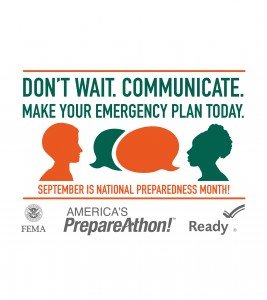As part of our nation’s military, whether on active duty, reserves, civilian employee or family member, you play an important role in ensuring the welfare of our homeland. It is also important to prepare yourself and your family for all types of emergencies so you can increase your personal sense of security and peace of mind.
Each installation has a Readiness and Emergency Management Flight that provides emergency management education materials and briefings to the military and family members.
They coordinate and integrate all activities to build, sustain and improve the installation’s ability to mitigate against, prepare for, respond to and recover from threatened or actual natural disasters, acts of terrorism or other man-made disasters.
Every military unit on the installation has an emergency management representative assigned to ensure the military members and their family members are informed of these actions.
The installation plan for emergency management is the Comprehensive Emergency Management Plan 10-2. Military members should ensure their family members are aware of the who, what, when, where and how actions prescribed in the CEMP 10-2 and supporting checklists.
Considerations for All Military Personnel & Families
- Every time you relocate, learn the types of emergencies likely to affect the area and update your emergency kit and plan with new materials if necessary.
- You may not have extended family nearby, so a rendezvous point or call-in contact after an emergency may require more ingenuity. Establish an emergency plan with an out-of-town contact you can all reach. Keep in mind that one or more family members may be deployed when disaster strikes.
- If you live off base, threat levels or other circumstances may keep you from getting back on base for day-to-day activities following an emergency. Know alternative places to shop or obtain things you normally get on base.
- Collecting and recording important personal and financial documents is already a part of preparing for deployment. Be sure to include these documents in your family’s emergency kit.
- During or after an emergency, you need to report to your command. Learn and follow the established procedures.
If you are stationed abroad
- Post emergency telephone numbers (fire, police, ambulance, etc.) by the phones in your home. Emergency phone numbers: 112 or the MP desk DSN: 430-5262/civ. 0711-680-5262.
- Your emergency kit should include some additional items, such as passports, birth abroad certificates for children born overseas, cash in the local currency, a card with local translations of basic terms and an electrical current converter.
- If you live off base, learn a few key phrases in the host nation language and get to know neighbors who could alert you about an ongoing emergency.
- For an emergency that occurs “outside the fence,” response (evacuations, shelter instructions, etc.) will be led by the local government. Cooperate with the host-nation responders and follow their instructions.

